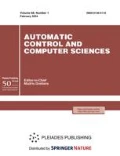Abstract
First-order program schemata represent one of the most simple models of sequential imperative programs intended for solving verification and optimization problems. We consider the decidable relation of logical-thermal equivalence on these schemata and the problem of their size minimization while preserving logical-thermal equivalence. We prove that this problem is decidable. Further we show that the first-order program schemata supplied with logical-thermal equivalence and finite-state deterministic transducers operating over substitutions are mutually translated into each other. This relationship makes it possible to adapt equivalence checking and minimization algorithms developed in one of these models of computation to the solution of the same problems for the other model of computation. In addition, on the basis of the discovered relationship, we describe a subclass of first-order program schemata such that minimization of the program schemata from this class can be performed in polynomial time by means of known techniques for minimization of finite-state transducers operating over semigroups. Finally, we demonstrate that in the general case the minimization problem for finite state transducers over semigroups may have several non-isomorphic solutions.
Similar content being viewed by others
References
Glushkov, V.M. and Letichevsky, A.A., Theory of discrete transducers, Vopr. Algebry Logiki, 1973, pp. 5–39
Ershov, A.P., Reducing the problem of saving memory when making programs to the problem of graph vertex coloring, Dokl. Akad. Nauk SSSR, 1962, vol. 142, no. 4, pp. 785–787.
Ershov, A.P., Current state of the theory of program schemes, Probl. Kibern., 1973, vol. 27, pp. 87–110.
Zakharov, V.A. and Novikiva, T.A., A time-polynomial algorithm for verifying the logical-thermal equivalence of programs, Tr. Inst. Sist. Progr., 2012, vol. 22, no. 4, pp. 435–455.
Zakharov, V.A. and Podymov, V.V., Application of equivalence checking algorithms for program optimization, Tr. Inst. Sist. Progr., 2015, vol. 27, no. 3, pp. 145–174.
Zakharov, V.A. and Temerbekova, G.G., On the minimization and equivalence checking of sequential reactive systems, Syst. Inf., 2016, vol. 7, pp. 33–44.
Zakharov, V.A., Problemy ekvivalentnosti program: Modeli, algoritmy, slojnost (Program Equivalence Problems: Models, Algorithms, and Complexity), 2016, pp. 1–304
Itkin, V.E., Logical-thermal equivalence of programs, Kibernetika, 1972, no. 1, pp. 5–27.
Kotov, V.E. and Sabelfeld, V.K., Teoriya skhem program (Theory of Program Schemes), 1991, pp. 1–348
Krinickij, N.A., Ravnosil’nye preobrazovaniya algoritmov i programmirovanie (Equivalent Algorithm Transformations and Programming), 1970, pp. 1–210
Lavrov, S.S., About saving memory in closed operator schemes, Zh. Vychisl. Mat. Mat. Fiz., 1961, vol. 1, no. 4, pp. 15–19.
Lyapunov, A.A., About logical schemes of programs, Probl. Kibern., 1958, vol. 1, pp. 46–74.
Podlovchenko, R.I., Models of sequential programs used to study the functional equivalence of programs, Kibernetika, 1979, no. 1, pp. 20–28.
Yanov, Yu.I., On logical schemes of algorithms, Probl. Kibern., 1958, vol. 1, pp. 75–127.
Eder, E., Properties of substitutions and unifications, J. Symbolic Comput., 1985, vol. 1, no. 1, pp. 31–46.
Ershov, A.P., Alpha—an automatic programming system of high efficiency, J. Assoc. Comput. Mach., 1966, vol. 13, no. 1, pp. 17–24.
Friedman, E.P., Equivalence problems for deterministic languages and monadic recursion schemes, J. Comput. Syst. Sci., 1977, vol. 14, no. 3, pp. 362–399.
Harju, T. and Karhumaki, J., The equivalence of multi-tape finite automata, Theor. Comput. Sci., 1991, vol. 78, no. 2, pp. 347–355.
Luckham, D.C., Park, D.M., and Paterson, M.S., On formalized computer programs, J. Comput. Syst. Sci., 1970, vol. 4, no. 3, pp. 220–249.
Mohri, M., Minimization algorithms for sequential transducers, Theor. Comput. Sci., 2000, vol. 234, pp. 177–201.
Muchnick, S., Advanced Compiler Design and Implementation, 1997, pp. 1–856
Rutledge, J.D., Program schemata as automata, Proc. of the 11-th Annual Symposium on Switching and Automata Theory (SWAT 1970), 1970, pp. 7–24
Sabelfeld, V.K., The logic-termal equivalence is polynomial-time decidable, Inf. Process. Lett., 1980, vol. 10, no. 2, pp. 57–62.
Senizergues, G., The equivalence problem for deterministic pushdown automata is decidable, Lect. Notes Comput. Sci., 1997, vol. 1256, pp. 271–281.
Shofrutt, C., Minimizing subsequential transducers: A survey, Theor. Comput. Sci., 2003, vol. 292, pp. 131–143.
Watson, B.W., A taxonomy of finite automata minimization algorithm, Comput. Sci. Rep., Eindhoven Univ. Technol., 2005, vol. 93, no. 44, pp. 1–32.
Zakharov, V.A., On the decidability of the equivalence problem for orthogonal sequential programs, Grammars, 1999, vol. 2, no. 3, pp. 271–281.
Zakharov, V.A., Equivalence checking problem for finite state transducers over semigroups, Lect. Notes Comput. Sci., 2015, vol. 9270, pp. 208–221.
Author information
Authors and Affiliations
Corresponding author
Additional information
Published in Russian in Modelirovanie i Analiz Informatsionnykh Sistem, 2017, Vol. 24, No. 4, pp. 415–433.
The article was translated by the authors.
About this article
Cite this article
Zakharov, V.A., Jaylauova, S.R. On the Minimization Problem for Sequential Programs. Aut. Control Comp. Sci. 51, 689–700 (2017). https://doi.org/10.3103/S0146411617070288
Received:
Published:
Issue Date:
DOI: https://doi.org/10.3103/S0146411617070288




